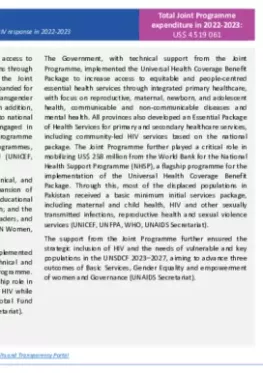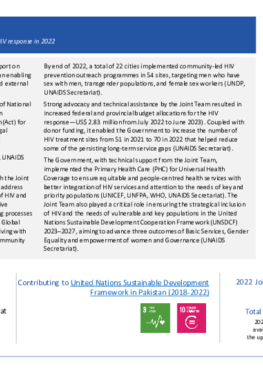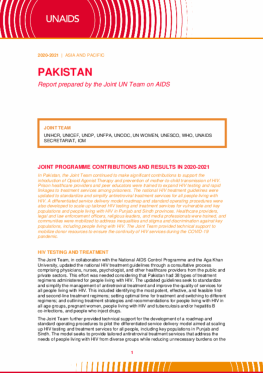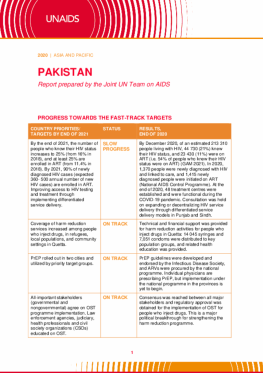|
Pakistan
During the 2022-2023 biennium, Pakistan scaled up access to community-led HIV programmes among key populations through significant technical and financial support from the Joint Programme. For instance, HIV testing services were expanded for gay men and other men who have sex with men, transgender people and female sex workers across the country. In addition, community-led HIV responses have been integrated into national HIV plans and communities have been actively engaged in planning, budgeting, resource mobilization, programme implementation and monitoring phases of various programmes, including those supported through the Global Fund (UNICEF, UNDP, UNFPA, WHO, UNAIDS Secretariat).
The Joint Programme enhanced its advocacy, technical, and resource mobilization efforts, resulting in the expansion of various HIV prevention programmes in prisons and educational settings; the empowerment of transgender population; and the sensitisation of law enforcement agencies, religious leaders, and the media on HIV (UNICEF, UNDP, UNFPA, UNODC, UN Women, UNESCO, UNAIDS Secretariat).
The Association of People Living with HIV (APLHIV) implemented the Stigma Index 2.0 study in 2023, thanks to technical and financial assistance mobilized through the Joint Programme. APLHIV was further equipped to play a critical leadership role in advocacy and service provision for people living with HIV while ensuring government accountability through the Global Fund Country Coordinating Mechanism (UNDP, UNAIDS Secretariat).
The Government, with technical support from the Joint Programme, implemented the Universal Health Coverage Benefit Package to increase access to equitable and people-centred essential health services through integrated primary healthcare, with focus on reproductive, maternal, newborn, and adolescent health, communicable and non-communicable diseases and mental health. All provinces also developed an Essential Package of Health Services for primary and secondary healthcare services, including community-led HIV services based on the national package. The Joint Programme further played a critical role in mobilizing US$ 258 million from the World Bank for the National Health Support Programme (NHSP), a flagship programme for the implementation of the Universal Health Coverage Benefit Package. Through this, most of the displaced populations in Pakistan received a basic minimum initial services package, including maternal and child health, HIV and other sexually transmitted infections, reproductive health and sexual violence services (UNICEF, UNFPA, WHO, UNAIDS Secretariat).
The support from the Joint Programme further ensured the strategic inclusion of HIV and the needs of vulnerable and key populations in the UNSDCF 2023–2027, aiming to advance three outcomes of Basic Services, Gender Equality and empowerment of women and Governance (UNAIDS Secretariat).





